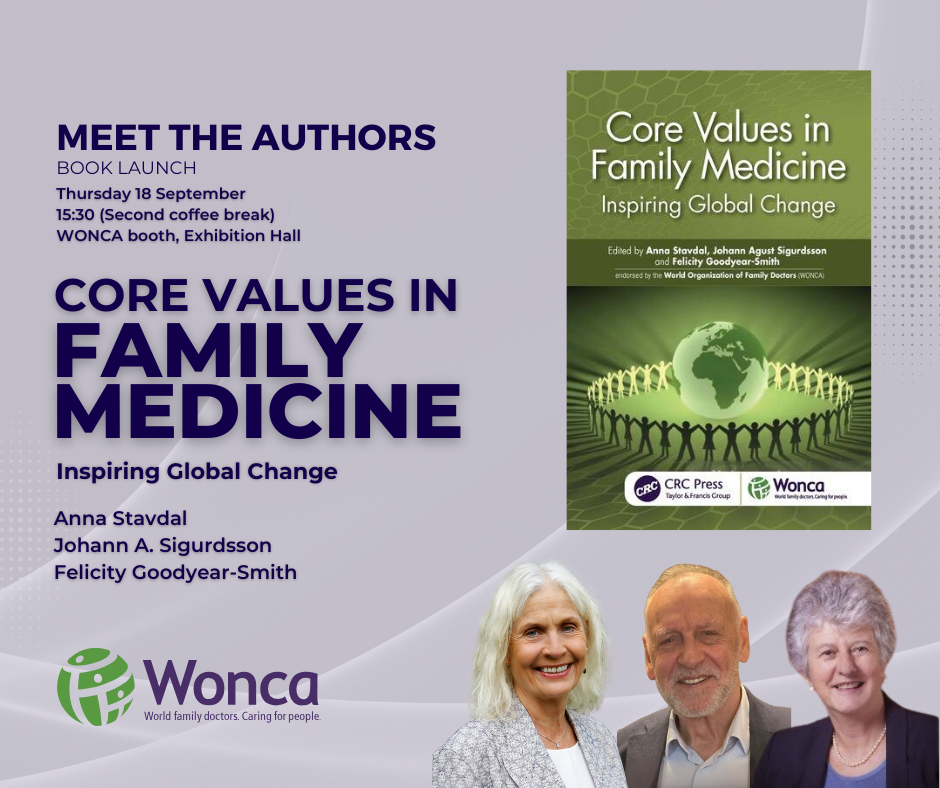Author Interview: Exploring Core Values in Family Medicine

This interview with Professor Felicity Goodyear-Smith, co-author of the upcoming book Core Values in Family Medicine: Inspiring Global Change, offers insight into how this global project came together. The book brings together regional perspectives from across the WONCA world, offering a unique look at the values and principles of family medicine around the globe.
How did this global core values project come about?
The initiative came from Anna Stavdal when she was president of WONCA. Previous work exploring core values had taken place in Norway in 2001, then with the Nordic countries in 2020, and across Europe in 2022. Building on that, Anna launched the global core values project in March 2023.
Family medicine has deep roots in countries like the UK, Australia, and New Zealand. To what extent have those Commonwealth traditions influenced the way we talk about core values today?
We agree, western values have dominated the discourse. That is why this project sought the views of family medicine from other part of the globe. People from high income countries tend to be individualistic, with a focus on personal autonomy, independence and uniqueness, self-realisation, individual rights and justice, and a competitive spirit is encouraged. This is reflected in their values. People from different countries, ethnicities, cultures and beliefs hold different values and principles. In Africa, South Asia and Asia Pacific these might be the importance of family and kinship; collectivism and communitarianism involving teamwork, collaboration and cooperation; spirituality; reciprocity; respect and humility. Their family medicine values and principles might centre around building strong, trusting relationships through empathy and compassion and integrating family and community services, whereas North America focused western values of equity, social accountability and autonomy.>
This project brought together teams from every WONCA region. How did the different teams approach the task – and what surprised you most?
This was not a research project and each region had the freedom to brainstorm and explore the issue in heir own way. Some sought to expand on an initial mapping exercise of material from websites to engage with member organisations to elicit their mission, vision and definition of family medicine. Workshops were run at regional meetings; surveys conducted of family doctors and even patient in one instance. Empathy and compassion were core values for all, which was not unexpected. We were particularly interested that the western concept of patient-centred care and shared decision-making did not resonate so well in regions and countries that are more family-focused, and where culturally it is more appropriate for patients to defer to the authority of the healer to make the decisions.
Some values like continuity or person-centredness are often considered universal. Did you find any tensions in how these were understood or prioritised?
We drew a distinction between values—such as compassion, empathy, and equity—and principles, like comprehensiveness, continuity, and patient-centred care. Different regions vary in how they prioritise or express these. What is “universal” may look quite different depending on context.
Did the project surface any reflections on traditional or indigenous knowledge systems?
Yes, especially in places where collective decision-making and reciprocity are part of the culture. These perspectives helped deepen our understanding of how core values are enacted, particularly in regions where traditional healing or spiritual beliefs are embedded in care practices. This enriched the whole exploration.
How has the concept of core values changed over time?
Family medicine has evolved significantly. In the past, GPs often worked solo, with continuity of provider as the norm. Today, we’re more likely to see continuity through teams or systems rather than a single doctor. The increasing use of digital tools, telehealth, and even AI will also affect how our values are expressed. Principles like comprehensiveness and coordination still matter, but the context is shifting rapidly.
The book aligns closely with global goals like UHC and the SDGs. How does this work contribute to those agendas?
The goal of universal health coverage is to ensure people get the services they need, without financial hardship. The SDGs call for equity, justice, and well-being. Strong family medicine systems are essential to achieving those goals, and understanding our core values helps clarify and strengthen our contribution.
Who is this book for – and how do you hope people will use it?
This book is for a wide audience: GPs, family physicians, family medicine specialists, and other primary care professionals like nurses, paramedics, and pharmacists. It’s also suitable as recommended reading in undergraduate and postgraduate training programmes. We hope it becomes a resource for learning, reflection, and advocacy.
And finally, what’s next?
Phase 2 of the project will be launched at the Lisbon conference. We’ll explore:
- What are physicians who provide generalist care called in different contexts?
- How are they trained?
- How are training schemes in accordance (or not) with core values and principles?
- What is their work context eg are they hospital-based or community-based doctors?
The aim is to deepen the global understanding of our discipline and support its evolution.
Meet the authors at the WONCA World Conference in Lisbon

Core Values in Family Medicine: Inspiring Global Change
Edited by Anna Stavdal, Jóhann A. Sigurdsson and Felicity Goodyear-Smith
Book launch: Thursday 18 September, 15:30 – 16:00 (Second coffee break)
Location: WONCA booth, Exhibition Hall
The book will be available for purchase at the conference, and can also be pre-ordered here:
Pre-order the book
Explore other titles in the WONCA Family Medicine Book Series:
See the full series
Video Interview